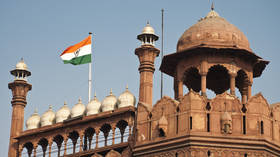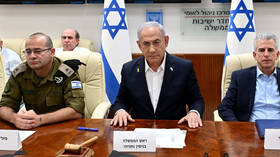India voices concern over Middle East escalation

New Delhi has expressed concern over the escalation of the conflict in the Middle East after Iran launched a significant retaliatory missile barrage against Israel on Tuesday evening, and West Jerusalem vowed to respond.
In its first official remarks on the escalation of violence in the region, the Indian government stated: “We are deeply concerned at the escalation of the security situation in West Asia, and reiterate our call for restraint by all concerned, and the protection of civilians.”
In a separate statement on Wednesday, New Delhi also issued a travel advisory to citizens traveling to Iran, warning them to “avoid all non-essential travel” to the country, citing the recent escalation. “Those currently residing in Iran are requested to remain vigilant and stay in contact with the Indian Embassy in Tehran,” it said.
Indian Prime Minister Narendra Modi spoke with his Israeli counterpart Benjamin Netanyahu by telephone on Monday, hours before the Israel Defense Forces (IDF) began a “limited, localized, and targeted” military campaign.
“Terrorism has no place in our world. It is crucial to prevent regional escalation and ensure the safe release of all hostages. India is committed to supporting efforts for an early restoration of peace and stability,” Modi wrote on X after his conversation with Netanyahu.
Prior to the Israeli ground offensive in Lebanon, it had waged a week-long bombing campaign in the neighboring country, assassinating senior Hezbollah members, including the group’s long-time leader Hassan Nasrallah. More than 1,000 people, including many civilians, have been killed and over one million displaced as a result of the attacks.
Last month, thousands of people in Lebanon were targeted by simultaneously exploding communication devices, killing at least 37 people and injuring nearly 3,000 more, including many civilians. The attack, which is believed to have been carried by Israeli spy agency Mossad, drew international condemnation. Israel has neither confirmed nor denied involvement in the attack.
Meanwhile, Iranian Ambassador to India Iraj Elahi said in an interview with NDTV on Wednesday that his country would “strike Israel again” if West Jerusalem doesn’t refrain from attacking Tehran’s national assets and interests in the region. He expressed hope that India, “which has close ties with both sides” could help convince Israel “to stop its brutality in the region.”
New Delhi has been walking a diplomatic tightrope on the Gaza conflict since the deadly raid by Hamas militants on Israel on October 7, 2023. While it condemned the attack and continued to maintain strong diplomatic and economic relations with Israel, it has also expressed concern over civilian casualties in Gaza since the outbreak of the conflict. Last month, Modi met with Palestinian Authority President Mahmoud Abbas and expressed “deep concern” over the humanitarian crisis unfolding in Gaza and the “deteriorating security situation in the region.”













